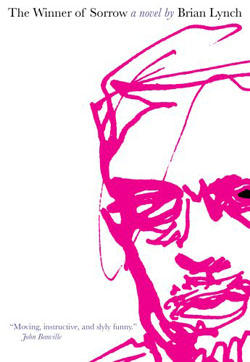The Winner of Sorrow
by Brian Lynch
reviewed by Paul Franz
Today, the English poet William Cowper (1731–1800) is best known for a handful of short works, including the hymn “Light Shining out of Darkness” and the lyrics “Epitaph on a Hare” and “The Castaway.” In his own time, Cowper first gained widespread recognition in 1785 with The Task, an extended meditation on domestic and country life. Subsequent years saw him produce groundbreaking, though underappreciated, blank-verse translations of Homer’s Iliad and Odyssey. Then, in 1796, the death of his beloved friend Mary Unwin removed his main defense against the mental illness that had troubled him intermittently since his thirties. Out of this darkness, “The Castaway,” written in 1799, shines an ambiguous light: perhaps Cowper’s greatest short poem, its terrifying conceit reflects his conviction that he was destined to be damned.
After Cowper’s death, his cousin, Lady Hesketh, warned that his biographer, “whoever he might be, shou’d not consider himself as the writer of a novel.” Her anxiety, of course, had less to do with the risk of untruth than its opposite, particularly given a novel’s freedom to explore the personal realm. In The Winner of Sorrow, by Irish poet, playwright, and screenwriter Brian Lynch, this fear has finally materialized. Shortlisted for the 2006 Hughes and Hughes Irish Novel of the Year Prize, Lynch’s first novel (published when he was fifty) marshals the resources of imaginative fiction, combined with an intimate command of the available biographical material, to craft a striking inner portrait of Cowper, those around him, and their world.
Before hitting its main narrative stride in Cowper’s thirties, the book spends its opening pages veering dreamily between the last year of the poet’s life and scenes from his earliest childhood. The latter, seen through the stereoscope of remembered formative experience, offer an extreme example of Lynch’s incisive and sharply visual style: “Outside the house there was a noise. He got out of bed and saw a great beast trampling the earth and striking sparks from the stones. It was a horse. A man slid off its back and the door of the house opened a path of light to him.” These flashbacks, which appear in chronological order, steadily displace the framing narrative until it disappears entirely. This coincides with the first crisis of Cowper’s adult years: his mental breakdown and attempted suicide the night before his examination for a sinecure with the House of Lords.
Briefly hospitalized, Cowper is released after converting to evangelical Christianity. Now, turning his back on London and his prospective career, he settles in Huntingdon, a rural community not far from Cambridge. There, he befriends the family of the Reverend Unwin, whom he joins as a lodger. After Unwin’s unexpected death, Cowper and Unwin’s widow, Mary, come under the colorful wing of John Newton, evangelical preacher, former slave-trader, and the author of “Amazing Grace.” Soon, they and the rest of the household join Newton in Olney. The remaining three-quarters of the novel chart Cowper’s life with Mrs. Unwin and the various threats to its platonic balance. In the process, we witness Cowper’s slide into mental disturbance, his drift apart from Newton and spiritual hope, as well as his development as a poet and translator.
Lynch’s work is remarkable not only for its sustained, subtle evocation of Cowper’s emotional and imaginative life, but also for the light it shines on the figures surrounding him, many of whom appear—if at all—in historical and biographical records as only the faintest names and snatches of writing and reported speech. Despite the book’s structure of frame and flashback, its world is not exclusively seen through Cowper’s eyes. Instead, Lynch’s constantly shifting perspective animates his narrative with the interests, fears, and desires of even his most minor characters. This sense of the inner dimension of shared experience, combined with his dramatist’s ear, make Lynch a master at staging conversations, in all their cross-purposes, omissions, and unforeseen connections.
It is this underlying empathy, combined with the clarity, resonance, and wit of its language, that establishes the continuity between The Winner of Sorrow and Lynch’s earlier work as a translator (of Paul Celan) and poet (his Poems: New and Renewed appeared in 2004). This unusual novel should lead readers not only back to Cowper, but also to the distinctive earlier works of Brian Lynch.
Published on March 6, 2015

